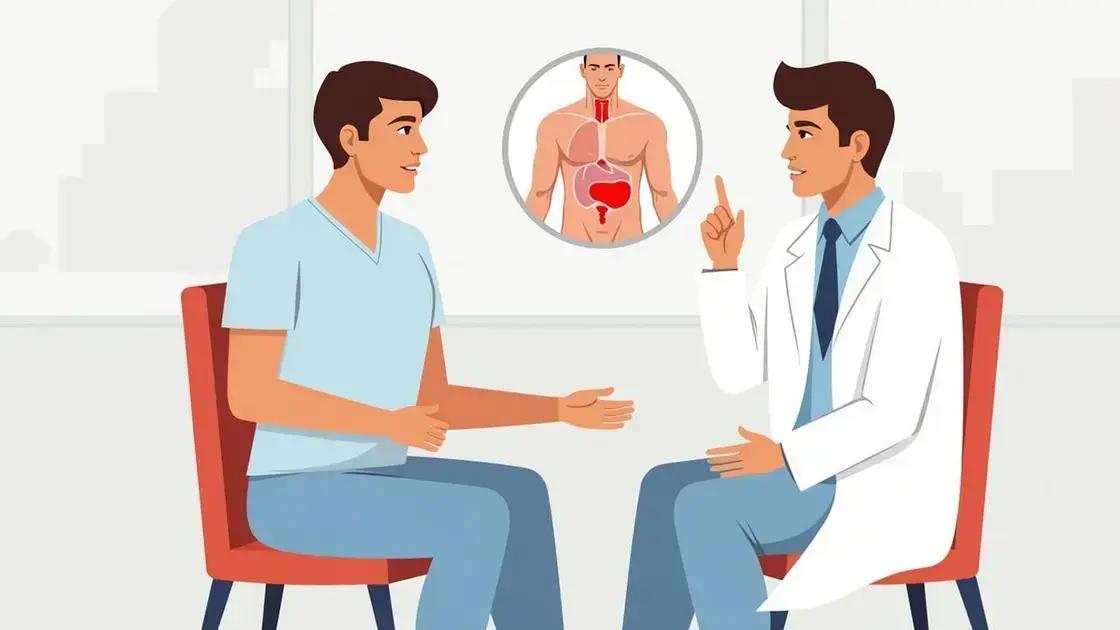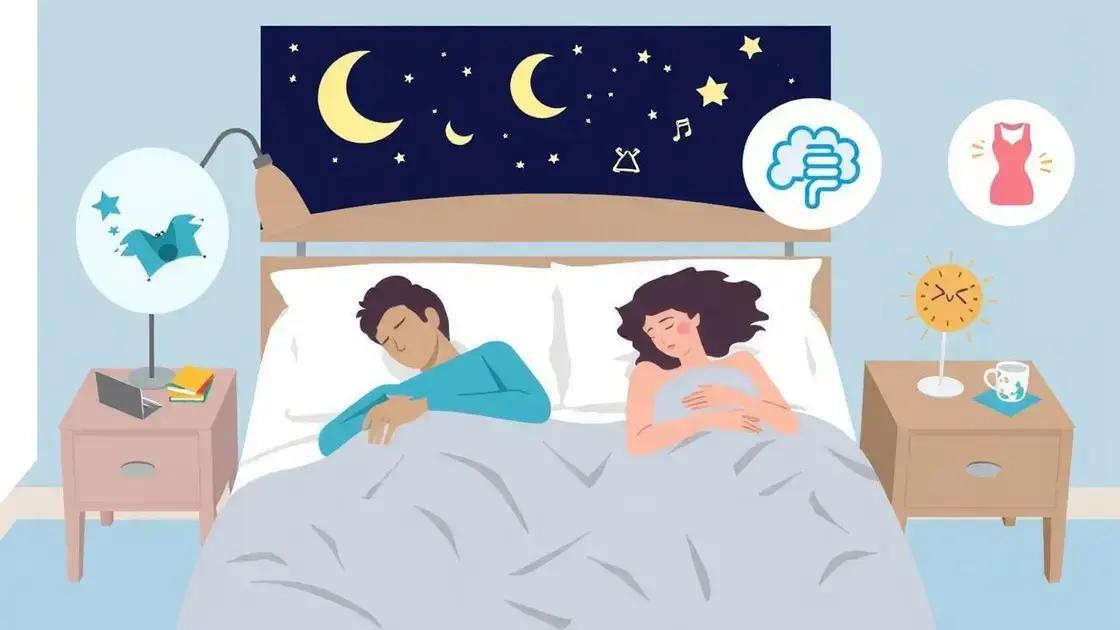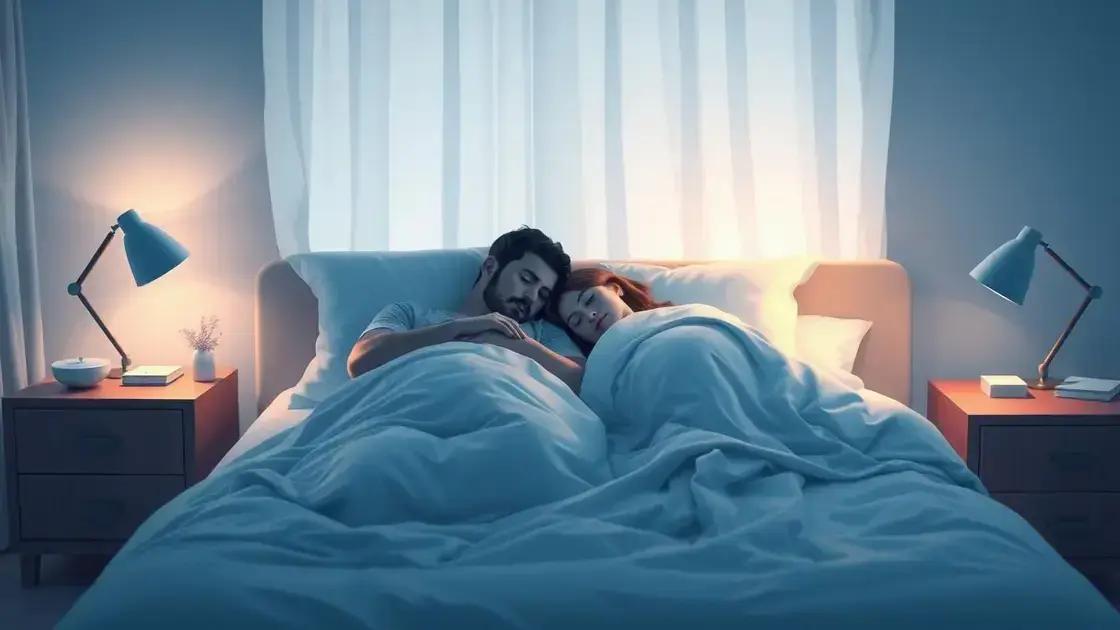Erectile dysfunction (ED) can significantly affect sleep patterns, as poor sleep quality may lower testosterone levels and contribute to anxiety, exacerbating ED. Improving sleep through consistent routines, relaxation techniques, and lifestyle changes can enhance both sleep and erectile health, while seeking professional help is crucial for persistent issues.
Many individuals wonder, does erectile dysfunction affect sleep patterns? It’s a question that invites curiosity and concern, as the effects of sexual health can ripple through various aspects of life, including sleep. In this article, we will delve into the intricate relationship between sleep quality and erectile dysfunction (ED). Understanding this link is crucial not just for those experiencing ED but also for anyone interested in overall health and wellness. Join us as we explore the factors that contribute to both sleep issues and erectile dysfunction, and discover effective coping strategies.
Understanding Erectile Dysfunction

Erectile dysfunction (ED) is the inability to get or maintain an erection that is firm enough for sexual intercourse. It is more common than many realize, affecting men of all ages. While often associated with aging, various factors contribute to ED, making it a complex issue that involves both physical and psychological aspects.
Physical Causes
Numerous physical conditions can lead to erectile dysfunction. These include diabetes, heart disease, obesity, hypertension, and hormonal imbalances. These health conditions can affect blood flow, nerve function, and hormone levels, all essential for achieving an erection. For example, men with diabetes often experience nerve damage and poor circulation, which can complicate sexual arousal.
Psycho-emotional Factors
In addition to physical issues, psychological factors also contribute to erectile dysfunction. Stress, anxiety, depression, and relationship problems can hinder sexual performance. Feelings of inadequacy or fear of failure can create a cycle of anxiety that may worsen ED over time. It is essential to address these emotional components to improve erectile health.
Impact on Lifestyle
Lifestyle choices play a significant role in erectile dysfunction. Poor diet, sedentary behavior, smoking, and excessive alcohol consumption can exacerbate the problem. Making healthy lifestyle changes, like exercising regularly and following a balanced diet, can improve not only erectile function but also overall health.
Importance of Seeking Help
Understanding the causes of erectile dysfunction is critical for affected individuals. Many men feel embarrassed to discuss their symptoms, but seeking help is crucial. Healthcare professionals can conduct assessments to identify underlying causes and recommend appropriate treatments. Whether through medication, therapy, or lifestyle changes, solutions are available to help manage and resolve ED.
The Link Between Sleep and Sexual Health

There is a significant connection between sleep and sexual health that many may not realize. Quality sleep is essential for overall well-being, including maintaining healthy sexual function. When you sleep, your body goes through various stages that are crucial for repairing tissues, regulating hormones, and strengthening the immune system. Disruptions in sleep can lead to issues like erectile dysfunction (ED).
Hormone Regulation
During deep sleep, the body releases important hormones such as testosterone. This hormone is vital for sexual desire and performance in men. Insufficient sleep can lead to lower testosterone levels, which may reduce libido and contribute to erectile dysfunction. Studies show that men who sleep poorly often experience lower testosterone levels compared to those who get adequate rest.
Stress and Anxiety
Poor sleep can increase stress and anxiety, which in turn can affect sexual health. When an individual is stressed, the body produces the hormone cortisol, which can interfere with sexual arousal and performance. This cycle can make it difficult for a person to feel relaxed enough for sexual activity, further complicating issues like erectile dysfunction.
Impact on Relationships
Inadequate sleep can also affect interpersonal relationships. When someone is tired or irritable due to lack of sleep, it can lead to communication problems and prevent intimacy. Healthy relationships often depend on emotional and physical connection, both of which can be negatively impacted by poor sleep.
Sleep Disorders
Conditions like sleep apnea can contribute to both sleep disturbances and erectile dysfunction. Sleep apnea leads to interrupted breathing during sleep, causing individuals to wake frequently. This not only affects sleep quality but can also lead to diminished sexual health. Treating sleep disorders can improve both sleep and sexual function.
How Sleep Quality Impacts ED

Sleep quality plays a crucial role in determining the severity of erectile dysfunction (ED). When a person does not get enough sleep or experiences poor quality sleep, it can significantly impact their sexual health. The relationship between sleep and ED is complex, as both conditions can influence each other.
Effects of Sleep Deprivation
Sleep deprivation can lead to fatigue, irritability, and reduced sexual desire. Studies show that men who do not get enough sleep are more likely to report issues with achieving or maintaining an erection. Lack of sleep can disrupt the body’s natural hormonal balance, leading to lower levels of testosterone, which is essential for male libido and erectile function.
Importance of REM Sleep
Rapid Eye Movement (REM) sleep is particularly important for sexual health. During REM sleep, the brain is highly active, and this stage is when the body experiences increased blood flow to the penis. If a person frequently wakes up during this sleep stage, it can hinder the body’s ability to achieve erections. Overall, good quality sleep, including adequate REM cycles, is crucial for sexual efficacy.
Impact on Mental Well-being
Poor sleep quality can also lead to increased stress and anxiety, which can exacerbate erectile dysfunction. When a person is not well-rested, they may feel more anxious about sexual performance, creating a cycle that worsens both sleep quality and ED. Addressing mental health and prioritizing stress reduction techniques, such as mindfulness and relaxation exercises, can improve both sleep and sexual function.
Healthy Sleep Habits
Adopting healthy sleep habits can directly impact erectile health. This includes establishing a regular sleep schedule, creating a relaxing bedtime routine, and ensuring a comfortable sleep environment. Limiting screen time before bed and avoiding stimulants, such as caffeine, can also help improve sleep quality. When sleep hygiene is prioritized, it can lead to better overall health and potentially improve symptoms of erectile dysfunction.
Coping Strategies for Better Sleep and Erectile Health

Improving sleep quality can have a positive effect on erectile health. Here are some effective coping strategies to enhance both sleep and sexual wellness:
Establish a Sleep Routine
Going to bed and waking up at the same time each day helps regulate your body’s internal clock. A consistent sleep routine can help you fall asleep faster and improve the quality of your sleep.
Create a Relaxing Bedtime Environment
Making your bedroom conducive to sleep is essential. Consider darkening the room with curtains, using comfortable bedding, and keeping the room cool. A peaceful environment encourages better sleep and can improve sexual health.
Practice Relaxation Techniques
Engaging in relaxation techniques, such as deep breathing exercises, meditation, or yoga, can help reduce stress and anxiety. These practices prepare your body for sleep and may enhance sexual performance by calming the mind.
Limit Stimulants and Screen Time
Avoiding caffeine, nicotine, and electronic screens at least an hour before bedtime is critical. These stimulants can interfere with your ability to fall asleep and may contribute to sleep disturbances.
Exercise Regularly
Regular physical activity can improve sleep quality and reduce stress levels. Aim for at least 30 minutes of moderate exercise most days of the week. Not only does exercise enhance physical health, but it also promotes better sexual function.
Seek Professional Help
If sleep problems persist, it might be time to consult a healthcare professional. They can help identify any underlying issues and provide tailored advice or treatment options, whether for sleep disturbances or erectile dysfunction.
Seeking Help: When to Consult a Professional

Knowing when to seek professional help for erectile dysfunction is important for addressing the issue effectively. If you experience any of the following signs, it may be time to consult a healthcare provider:
Persistent Issues
If you frequently struggle with obtaining or maintaining an erection, this may signal an underlying health concern. Occasional difficulties are common, but consistent problems warrant professional evaluation.
Emotional Distress
If erectile dysfunction is causing significant anxiety, stress, or depression, seeking help is crucial. Mental health can significantly affect sexual health, and a professional can help address these emotional challenges.
Relationship Strain
When erectile dysfunction leads to frustration or tension in your relationship, it’s essential to talk to a professional. A healthcare provider can offer insights on how to manage the situation and improve your emotional connection.
Underlying Health Conditions
Conditions such as diabetes, heart disease, or hypertension that affect your overall health may also impact erectile function. If you have any existing health issues, it’s vital to discuss them with your doctor as they can influence your sexual health.
Changes in Hormone Levels
Experiencing changes in libido or sexual desire? These may be linked to hormone imbalances, such as low testosterone levels. A healthcare professional can help evaluate your hormone levels and recommend treatments if necessary.
Sleep Disorders
If you suspect that poor sleep quality or disorders like sleep apnea are affecting your erectile function, discussing these concerns with a doctor is beneficial. They can assist in diagnosing and treating sleep-related issues affecting your health.
Addressing Erectile Dysfunction and Sleep Quality
In conclusion, understanding the connection between erectile dysfunction and sleep patterns is crucial for overall well-being. As we have explored, sleep quality plays a significant role in sexual health, influencing hormone levels and emotional well-being.
Utilizing coping strategies can improve both sleep and erectile health, helping to break the cycle of dysfunction. Importantly, recognizing when to seek professional help is key, especially if issues persist. By proactively addressing these challenges, individuals can enhance both their sleep quality and sexual function.
Improved sleep and sexual health can lead to stronger relationships, better mental health, and an overall enhanced quality of life. Take the next step towards better health today!
FAQ – Frequently Asked Questions About Erectile Dysfunction and Sleep Patterns
How does sleep affect erectile dysfunction?
Poor sleep quality can lower testosterone levels and increase stress, both of which can contribute to erectile dysfunction.
What are some strategies to improve sleep quality?
Establishing a consistent sleep routine, creating a relaxing sleep environment, and practicing relaxation techniques can help improve sleep.
When should I consult a professional about erectile dysfunction?
If you experience persistent issues with erections, emotional distress, or changes in libido, it’s important to seek professional help.
Can lifestyle changes help with erectile dysfunction?
Yes, adopting a healthy lifestyle, including regular exercise, a balanced diet, and reducing alcohol and tobacco use, can improve erectile health.
Is erectile dysfunction a normal part of aging?
While erectile dysfunction can be more common as men age, it is not considered a normal part of aging and should be addressed.
How can I talk to my partner about erectile dysfunction?
Open and honest communication about your feelings and concerns regarding erectile dysfunction can help strengthen your relationship and improve intimacy.













